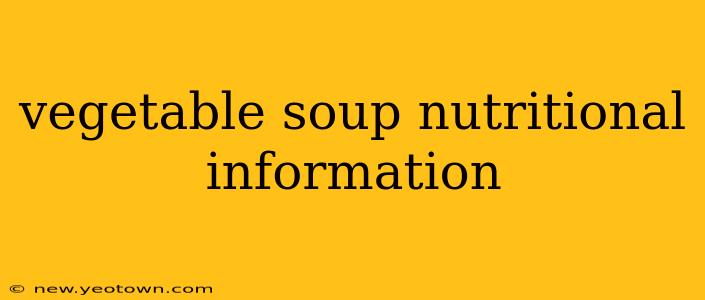Ah, vegetable soup. The comforting aroma, the vibrant colors, the satisfying warmth… it's more than just a delicious meal; it's a nutritional powerhouse packed with vitamins, minerals, and fiber. But what exactly is in that bowl of goodness? Let's dive into the nutritional information of vegetable soup, exploring its benefits and uncovering some delicious variations.
My journey into the world of vegetable soup started with my grandmother. Her kitchen, always fragrant with simmering herbs and spices, was the birthplace of countless bowls of nourishing soup. It wasn't just about taste; it was about well-being, a concept deeply ingrained in her culinary philosophy. Now, I want to share that knowledge with you.
What are the main nutritional benefits of vegetable soup?
The beauty of vegetable soup lies in its versatility. The nutritional profile can vary dramatically depending on the vegetables used, but generally speaking, you're looking at a rich source of:
- Vitamins: A and C are common, alongside smaller amounts of B vitamins, depending on the ingredients. Leafy greens boost the folate content, while carrots and sweet potatoes contribute beta-carotene.
- Minerals: Potassium, magnesium, and iron are frequently found in good quantities, particularly if you include ingredients like beans, lentils, or spinach.
- Fiber: This is a major player in vegetable soup's health benefits. Fiber promotes digestive health, helps regulate blood sugar, and contributes to feelings of fullness. Legumes, root vegetables, and leafy greens are particularly high in fiber.
- Antioxidants: Many vegetables are rich in antioxidants, which combat free radicals and protect your cells from damage.
What are the calories in a typical bowl of vegetable soup?
This is where things get tricky. A bowl of creamy potato soup will have significantly more calories than a light broth-based soup with lots of leafy greens. Generally, a serving (around 1.5 cups) of vegetable soup can range from 100 to 300 calories, depending on ingredients and preparation methods. Cream-based soups are naturally higher in calories and fat.
How many carbs, protein, and fats are in vegetable soup?
The macronutrient breakdown varies considerably. A high-vegetable, low-starch soup will be lower in carbohydrates and higher in fiber. Adding beans or lentils will significantly increase the protein content. The fat content largely depends on whether you use oil or broth as a base, and if you include ingredients like cream or cheese. A general estimate for a 1.5 cup serving:
- Carbohydrates: 15-40g (largely from vegetables and any grains included)
- Protein: 5-15g (higher with beans or lentils)
- Fat: 1-10g (depending on the recipe and added ingredients)
Is vegetable soup good for weight loss?
Yes, vegetable soup can be a fantastic addition to a weight-loss diet. It's generally low in calories and high in fiber, promoting satiety and helping you feel full for longer. This can curb cravings and reduce overall calorie intake. However, be mindful of added ingredients like cream, cheese, or excessive oil, which can significantly increase the calorie count.
What vegetables are best for making a nutritious vegetable soup?
The possibilities are endless! A truly nutritious soup includes a variety of colors and textures. Aim for a mix of:
- Leafy Greens: Spinach, kale, collard greens (excellent sources of vitamins and minerals)
- Cruciferous Vegetables: Broccoli, cauliflower, Brussels sprouts (rich in fiber and antioxidants)
- Root Vegetables: Carrots, sweet potatoes, parsnips (provide vitamins and fiber)
- Legumes: Beans, lentils (boost protein and fiber)
- Onions and Garlic: Add flavor and contain beneficial compounds.
My grandmother always said, "A good soup tells a story." And her vegetable soup certainly did. It was a story of fresh ingredients, carefully chosen and lovingly prepared. It’s a story you can write too, customizing your own nutritious and delicious bowls of vegetable soup. Remember to choose a variety of vegetables to maximize the nutritional benefits and savor the experience!

